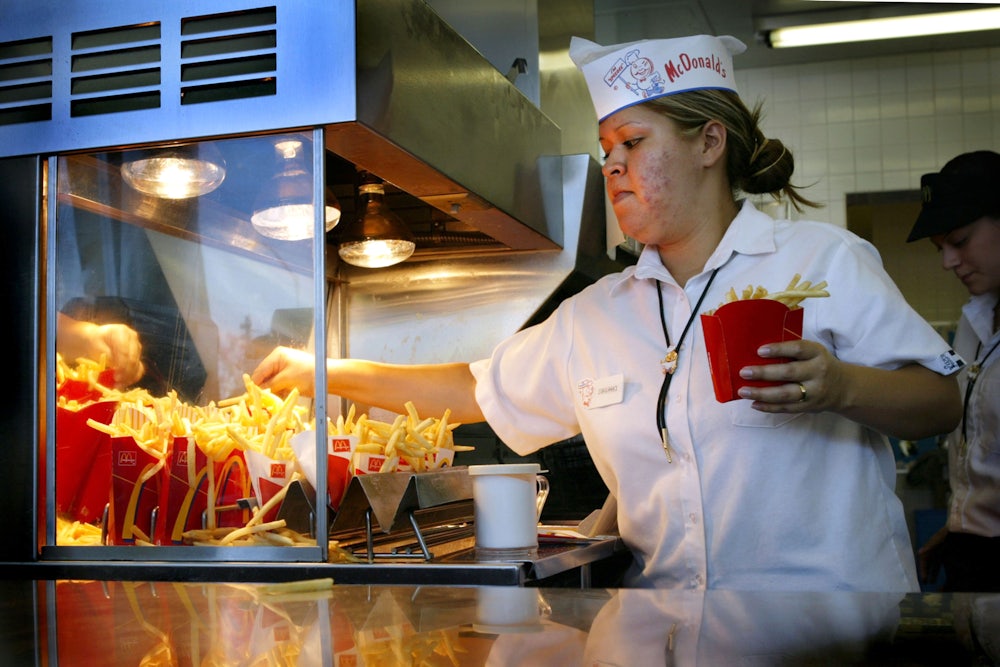At the end of last week, the $600 federal unemployment insurance supplement expired after a congressional deadlock on passing a new stimulus bill, leaving millions of laid-off workers without income that was helping them support themselves and their families. That, of course, was by design; the extra $600, Republicans insisted from the start, would make it all too easy for workers to stay home in the middle of a deadly pandemic. “It pays better to stay home than it does to come in and actually put yourself at a little bit of risk to come to work,” The Federalist’s Chris Bedford said on Fox News recently. “People need to get back to work, need to go out, they need to not be run by fear.”
Aside from the fact that it seems entirely reasonable to pay people to stay home—particularly as coronavirus cases continue to surge in many parts of the country and the death toll has since exceeded 150,000—there’s not much evidence to support the claim that unemployment insurance has deterred workers from returning to their jobs. But the curious situation of the enhanced unemployment benefits exceeding people’s wages also points to another grave (and worsening) aspect of American economic life that started well before the pandemic. A recent analysis by the Roosevelt Institute estimated that as many as 22 million people—or approximately 15 percent of the labor force in the country—did earn more money from collecting the enhanced pandemic unemployment than what they were paid by their jobs. That speaks less to the generosity of the dole than it does to the explosion of low-wage work over the past several decades, and any serious attempt to revive the devastated economy when the pandemic has passed will have to foreground that crisis.
Poverty wages are often treated as an inevitable and immutable part of the economy, and Republicans and Democrats alike routinely respond to the problem by simply encouraging low-wage workers to acquire more education or skills in order to move out of bad jobs. But wages across the board haven’t kept pace with increases in worker productivity since the 1970s, and over that same period, the low-wage service sector ballooned while higher paying industries like manufacturing declined. That trend only intensified in the wake of the Great Recession, where a significant portion of the middle-class jobs lost during that downturn were subsequently replaced during the recovery by low-wage positions. According to the Brookings Institution, today 44 percent of all workers between the ages of 18 and 64, or more than 53 million people, are low-wage hourly workers.
The cruel irony now is that low-wage workers—many of whom were swiftly and conveniently reclassified as “essential” as soon as statewide lockdowns began—have been hit especially hard by the pandemic. As The Boston Globe’s Katie Johnston wrote this week, low-wage workers, who are disproportionately Black and Latinx, have had to contend with unsafe conditions, a lack of adequate protective gear, and only meager paychecks to show for it as “hazard pay” bonuses have all but dried up. “I’m completely, 100 percent afraid,” Joe Koffi, a nursing home employee whose hazard pay raise recently ended, told Johnston. “The Covid is still everywhere. Why are they taking this money away?”
Given the sorry state of nearly half of all workers’ wages in this country, it won’t be enough for the jobs lost during lockdowns to come back (though even that is far from guaranteed). We should, as a number of Democratic policymakers have argued, extend the unemployment supplement for as long as it takes to safely weather the pandemic. But there’s also an opportunity in this moment to push for raising wages, which will be crucial over the long term as the country struggles to emerge from a new economic collapse.
At the end of July, the Roosevelt Institute released a proposal for a “Fair Wage Guarantee” to bridge an extension of the enhanced unemployment insurance with new incentives for employers to hire workers at higher wages when the country reopens. In their report, authors Bharat Ramamurti and Lindsay Owens called for tweaking the current unemployment insurance rules in order to give low-wage workers more leverage to bargain for wages comparable to what they were making on unemployment. Their proposal would additionally grant a tax credit to employers who pay higher wages as they hire back workers. “There is an inordinate amount of low paying work in the United States,” Ramamurti told me over the phone. “And it reflects the fact that workers have been systematically disempowered over the last thirty or forty years.”
According to Ramamurti, the Fair Wage Guarantee could also complement the ongoing fight to increase the federal minimum wage to $15 an hour. “Just looking at the current debate that’s going on in Congress, a minimum wage increase seems unlikely to happen over the next few weeks,” he said. “But what we like about our proposal is that it paves the way for a mandated minimum wage increase in the future.” That’s to say that while Washington’s attention remains fixed on unemployment, policies that connect raising wages to the immediate need to preserve and extend the federal unemployment insurance supplement could seed the ground for future fights to increase worker pay and make bad jobs better.
And even beyond the moral urgency of providing the country’s essential workers with more than just scraps, raising wages, Ramamurti pointed out, gives people more money to spend at a time when businesses are floundering. “It’s obviously really good for millions of people and their families to have extra income right now,” he said. “But it’s also really good for the economy.”
